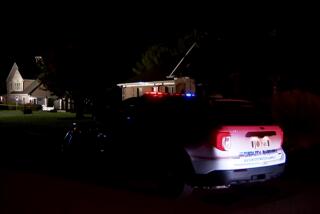Prosecutors Face Tough Choices on Trial Venues
- Share via
WASHINGTON — State and federal prosecutors will face a series of hard choices shaped by the politics of the death penalty when they meet today to discuss how to proceed with the two suspected snipers, legal experts say.
The most pressing decision to be made is jurisdictional: Where will the pair be tried?
With public emotions running high around a crime spree that has terrorized the Washington area for weeks, prosecutors want the case to lead to a swift conviction and a death sentence for the killers.
Logical Site
Montgomery County, Md., where six of the slayings took place, would be the logical venue for trying John Allen Muhammad, 41, and Lee Boyd Malvo, 17.
“It would be fair to assume that we would have every intention of seeking the death penalty,” county prosecutor Douglas Gansler said before the arrests.
But in May, Maryland Gov. Parris Glendening imposed a moratorium on capital punishment over concerns of racial bias. The two suspects in the sniper shootings are black.
Meanwhile, U.S. prosecutors in Baltimore said they would hold Muhammad and Malvo on federal weapon charges, leading to speculation that federal authorities will take over the case.
“I am certain the U.S. attorney here is anxious to try them, and capital punishment would not be an issue in the federal system,” said Michael Greenberger, a law professor at the University of Maryland in Baltimore. “The families will be upset about a prosecution where the death penalty is in doubt. They will insist on it. And the federal courthouse is usually a better, more secure place to try a big case like this.”
But it is not clear that the string of killings amounts to a federal crime.
Timothy J. McVeigh was tried, convicted and sentenced to death in the federal courts because his bombing of the federal building in Oklahoma City killed dozens of federal workers.
However, Greenberger said he believed the two suspects could be charged with an act of domestic terrorism under the USA Patriot Act passed last year.
It refers to crimes where “the intent is to intimidate the civilian population,” he said. “That seems to be what was going on here. These two guys paralyzed the nation’s capital area, and if they had gotten away with it, it was the perfect terrorist crime.
“Compare this to the anthrax scare. Everybody agrees that if somebody had been caught for that crime, they would be charged with a terrorism crime.”
But others disagree and say ordinary slayings of civilians do not make for a federal crime.
“A serial killer is not a terrorist, even if the crimes are pretty terrifying,” George Washington University law professor Stephen Saltzburg said. “I don’t see this leading to a federal charge.”
Both Maryland and the U.S. government exempt those who are under age 18 from their capital punishment laws. That eliminates the possibility of a death penalty charge in Maryland against Malvo.
Three of the sniper killings took place in Virginia, and prosecutors in the three separate counties could file murder charges that would lead to death sentences against both men.
Since 1976, when capital punishment was reinstated, Virginia has executed 86 people, second only to Texas. By comparison, Maryland has carried out only three executions.
And Virginia is one of the few states that continues to bring capital charges against murderers who are 17.
Prince William County prosecutor Paul Ebert said he would seek the death penalty for the Oct. 9 killing of a man at a Manassas gas station.
“I’d like to try him as soon as we could, but as a general rule, the state with the possession of the defendant takes jurisdiction first,” Ebert told Associated Press.
Malvo’s age could emerge as a significant and divisive issue, some defense lawyers said.
“It would be amazing if they [prosecutors] went shopping around for a state that kills kids,” said David Bruck, a capital defense lawyer in Columbia, S.C. On Monday, four justices of the Supreme Court -- one short of a majority -- said they were ready to abolish capital punishment for those under age 18.
“The practice of executing such [juvenile] offenders is a relic of the past,” wrote Justice John Paul Stevens. “We should put an end to this shameful practice.”
May Spur Prosecutions
Nonetheless, some experts said the sniper crimes could spur a move for multiple prosecutions geared to winning death sentences for both suspects.
“You could have a full trial and a conviction in Maryland, and then they will be extradited to Virginia and tried there too,” Saltzburg said.
While the Constitution’s ban on double jeopardy bars a second trial for the same crime, it does not prohibit multiple trials for defendants who have committed multiple murders.
Even so, Maryland will be the center of the legal action at the start, legal experts said.
“There is a tremendous feeling here that Maryland should go first. The murders started here and ended here,” Greenberger said.
More to Read
Sign up for Essential California
The most important California stories and recommendations in your inbox every morning.
You may occasionally receive promotional content from the Los Angeles Times.











